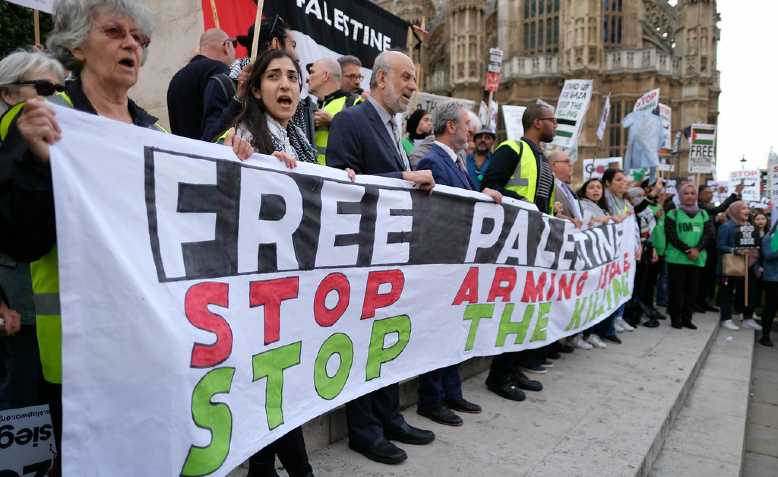 Palestine solidarity protest outside parliament on 5 June 2018. Photo: Alisdare Hickson/cropped from original/licensed under CC2.0, linked at bottom of article
Palestine solidarity protest outside parliament on 5 June 2018. Photo: Alisdare Hickson/cropped from original/licensed under CC2.0, linked at bottom of article
The International Criminal Court plans to investigate Israeli war crimes, but legalism is seriously limited against apartheid, argues Sybil Cock
The International Criminal Court (ICC) in the Hague announced a few days ago that it was able to proceed with an investigation of criminal acts by Israeli individuals against Palestinians. Namely, the indiscriminate killing of civilians and the transfer of civilian populations (settlers), illegal under the 4th Geneva Convention of 1950 which guarantees the protection of civilians at the time of war.
Crimes committed since June 2014 – before the deadly ‘protective edge’ attack on Gaza which claimed the lives of over 2,000 Palestinians – are included, opening the way for prosecutions on the international crime of Apartheid (a crime under the UN Rome statute) and other ‘continuous’ crimes.
Israeli Prime Minister Benjamin Netanyahu went ballistic, of course, claiming that the decision was ‘pure antisemitism’. He has appointed a top general to lead the campaign against any prosecutions and is lobbying hard among sympathetic states. Individuals who might be singled out are being warned. One politician has called for the final destruction of the Bedouin village of Khan al Ahmar as a reprisal.
The limits of legal remedies
The decision follows years of abstruse wrangling about whether or not the ICC has jurisdiction over the West Bank, Gaza and East Jerusalem.
Any investigators or prosecutors who want to gather evidence in Palestine would have to cross Israel’s borders to do so – making it tricky if not impossible, despite the fact that the ICC has said that there are ‘reasonable grounds’ to believe that crimes have been committed.
Along with the recent B’Tselem report on Apartheid, it does mean that the narrative of war crimes is in the headlines in Israel (second only to Netanyahu’s corruption trial) during an election campaign, and in the world.
Palestinian rights have for years been the hostages of international diplomacy, both in terms of prosecutions and in terms of negotiations around the establishment of an autonomous state. Hopes of legal remedies are unlikely to bring more than a chink of light. Israel has been blatant in its disregard for international law since its foundation in 1948.
The ICC process, if it goes ahead, will be protracted. The US under Trump imposed sanctions against ICC officials, including the prosecutor Fatou Bensouda, because of attempts to investigate US actions in Afghanistan.
In any case, Bensouda is leaving the role soon. Although her successor has yet to be announced, we can be pretty certain it will be a figure who allies themselves to the Western club of nations.
There are serious procedural issues, too. In December, Bensouda concluded in relation to the UK’s crimes in Iraq:
‘…there is a reasonable basis to believe that members of the British armed forces committed the war crimes of wilful killing, torture, inhuman/cruel treatment, outrages upon personal dignity, and rape and/or other forms of sexual violence.’
However, no action was taken, on the grounds that the British state had effectively investigated the allegations. It goes without saying that the UK did not prosecute any of its military as a result of these investigations.
Israel can take some comfort from this. Its judicial system is complex and far-reaching, and modelled on the British one. It does investigate some events, and an occasional soldier is indicted.
However, Israel does not recognise the Geneva convention. Crimes such as the punitive demolitions of the homes of prisoners’ families and the building of illegal settlements are not seen as crimes, so they are not investigated.
Readers who would like to stay informed on issues to do with Palestine can:
- Join PSC
- Follow the Electronic Intifada which runs multiple reports on Palestine.
- Follow Jonathan Cook’s blog or on Facebook. Jonathan is a journalist based in Nazareth.
Join Revolution! May Day weekender in London
The world is changing fast. From tariffs and trade wars to the continuing genocide in Gaza to Starmer’s austerity 2.0.
Revolution! on Saturday 3 – Sunday 4 May brings together leading activists and authors to discuss the key questions of the moment and chart a strategy for the left.

